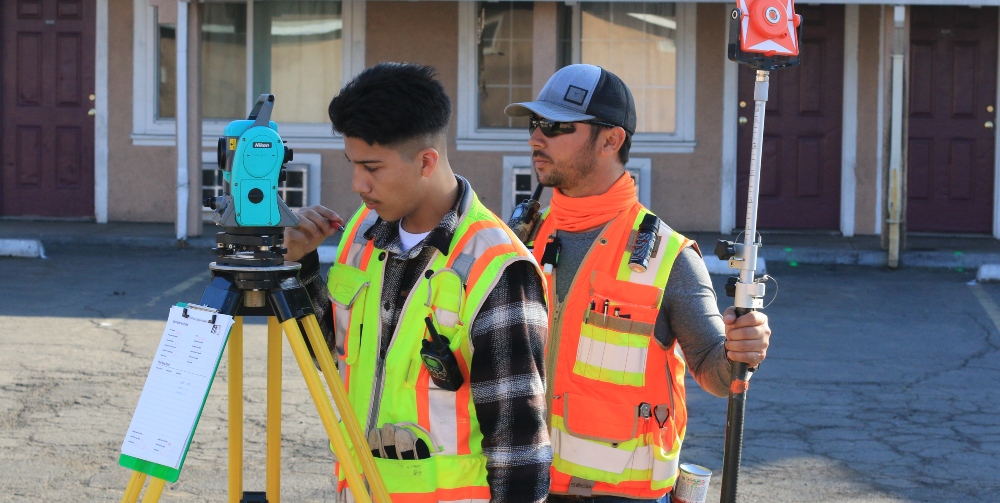In this salary spotlight series, we’re exploring one of the most pressing questions for both aspiring and practicing Surveyors: Surveyor salary.
We’ve already explored the salary of an Architect in another post, so make sure you give that a read if you’re more interested in that field.
Surveyors have an important role within the construction industry as they provide essential information for projects, ensuring that they are executed with precision and in compliance with legal requirements.
Knowing how much you can earn in this job is key as it helps you understand whether or not this role is right for you.
Whether you’re an aspiring Surveyor, a recent graduate working out your next career move, or a seasoned professional looking for insights into salary progression, we’ll be telling you everything you need to know about your earning potential.
It’s important to note that for the purpose of this blog, we’ll be focusing on Quantity Surveyors and Building Surveyors. If you’re interest in other disciplines within Surveying, the amount you can can earn may vary.
That said, let’s get started by outlining typical responsibilities for both of these roles.
What Does A Surveyor Do?
As discussed, we’re going to look at two different types of Surveyors within the construction industry.
Hopefully this information will help you decide which role is more suitable for you before you start your career hunt.
Quantity Surveyor
A Quantity Surveyor is primarily concerned with managing and controlling the costs associated with construction projects. Their responsibilities typically include:
- Preparing cost estimates, budgets, and financial reports for construction projects.
- Procuring and managing the supply chain, including subcontractors and suppliers.
- Evaluating and advising on the financial implications of design choices and construction methods.
- Assessing and valuing construction work, including variations and progress payments.
- Negotiating and managing contracts, claims, and disputes.
- Conducting feasibility studies and cost analysis for potential projects.
Overall, Quantity Surveyors play a crucial role in ensuring that construction projects are completed within budget, whilst maintaining quality standards and complying with regulations.
Building Surveyor
A Building Surveyor is involved in various aspects of building and property management. They are responsible for assessing the condition, compliance, and safety of buildings. Their duties may include:
- Conducting building surveys and inspections to identify defects, maintenance requirements, and compliance with building regulations.
- Assessing the suitability of buildings for specific purposes, such as occupancy or refurbishment.
- Providing advice on building codes, regulations, and standards.
- Issuing building permits and certificates of compliance.
- Managing and overseeing construction projects to ensure compliance with approved plans and regulations.
- Investigating and providing solutions for building-related problems, such as dampness, structural issues, or fire safety.
Building Surveyors play a critical role in ensuring that buildings are safe, functional, and meet the necessary legal and regulatory requirements.
While both roles are involved in the construction industry, their areas of focus and expertise differ.
To summarise: Quantity Surveyors mostly deal with cost management and financial aspects, while Building Surveyors focus more on the technical aspects of building construction, compliance, and maintenance.

Surveyor Salary UK
We’ve taken the findings below from our salary survey 2023 which you can view here.
The average Quantity Surveyor salary in the UK is: £66, 800
The average Building Surveyor salary in the UK is: £57, 450
The findings in this report reference over 16,754 survey respondents and give a true representation of the real estate sector.
Now in its twenty-third year, our salary survey provides a fantastic benchmark of remuneration and attitudes across the industry and is a highly valuable resource for employers and employees alike.
Whilst salary will of course differ depending on location, it’s useful to understand the average salary of a Surveyor as it gives you an idea of earning potential.
Average salary of a Surveyor across different regions
Aside from the UK, our survey also explores the average Surveyor salary across various regions.
This helps anyone searching for a role in surveying understand how salary changes depending on where the role is based.
It’s important to note that the below figures are an average. Exact salaries will also depend on the level of seniority, which we’re covering further in the blog post.
To keep things simple, we’ve separated the salaries depending on the specific role.
Quantity Surveyor Salaries
- Quantity Surveyor Salary Hong Kong – $64, 076
- Quantity Surveyor Salary Singapore – $67, 148
- Quantity Surveyor Salary China – $149, 217
- Quantity Surveyor South Africa – R 360, 000
Building Surveyor Salaries
- Quantity Surveyor Salary Hong Kong – $84, 550
- Quantity Surveyor Salary South Africa – R 574, 000

Factors Influencing Surveyor Salaries
Understanding the various factors that affect a Surveyor’s salary is essential for individuals aspiring to enter this field or professionals looking to advance their careers.
This section aims to explore the key elements that influence a Surveyor’s earnings and clarify how education, experience, location, and specialisation can impact earning potential.
By understanding these factors, you can make informed decisions about your career path.
Education and qualifications
The level of education and professional qualifications attained can significant affect a Surveyor’s salary. A higher level of education, such as a Bachelor’s or Master’s degree in surveying or a related field, demonstrates a deeper understanding of surveying principles, techniques, and industry best practices.
Additionally, having professional certifications from recognised organisations, such as the Royal Institution of Chartered Surveyors (RICS) or the National Society of Professional Surveyors (NSPS), further confirms a Surveyor’s expertise, thereby increasing their earning potential.
Seniority
The level of seniority achieved throughout their career can impact a Surveyor’s salary. As these professionals gain experience and progress into more senior positions, such as Senior Surveyor, Team or Head of Surveying, their responsibilities expand to include overseeing projects, managing teams, and making strategic decisions.
This increased level of accountability and leadership demands a higher salary to reflect the added value they bring to the organisation.
Seniority is often accompanied by years of practical experience, which further enhances a Surveyor’s skill set and contributes to their earning potential.
Experience and expertise
The amount of experience a Surveyor accumulates in the field greatly affects their salary.
Surveyors who have worked on a variety of projects and gained extensive hands-on experience have a deeper understanding of surveying methodologies, data analysis, and problem-solving techniques.
This is highly valuable to employers, as experienced Surveyors can handle complex projects, mitigate risks, and deliver accurate results efficiently.
Surveyors with specialised expertise may command higher salaries due to the rarity and demand for their skills. Additionally, Surveyors who have built a strong professional network and have a track record of successful projects can negotiate higher compensation based on their proven results and reputation in the industry.
Location
Geographic location can affect a Surveyor’s survey so it’s important to consider this when exploring jobs.
How much you can earn can vary widely based on the local cost of living, demand for Surveyors in the area, and economic factors.
For example, Surveyors working in areas with high construction activity may command higher salaries due to increased demand for their services and higher living costs. On the other hand, Surveyors in rural or less economically developed areas may have lower salaries due to lower demand and a lower cost of living.
Specialisation and niche markets
There are various specialisations within surveying, such as land surveying, hydrographic surveying, geodetic surveying, construction surveying, and many others.
Surveyors with specialised knowledge and skills in a high-demand field may earn higher salaries compared to generalist Surveyors.
Specialisations that require additional training, certifications, or expertise can command a higher salary due to the scarcity of professionals with those skills.

Surveyor Career Growth
Now that we’ve explored the average salary of a Surveyor across different regions, it’s time to look at typical career progression for this role.
Starting from Junior level all the way up to the Director, this gives you an insight into how you can progress with the right skills and experience.
Junior Surveyor
Junior Surveyors are responsible for supporting Senior Surveyors in conducting surveys and inspections. This includes tasks such as assisting in data collection, performing calculations, and preparing reports.
They will also contribute to cost estimations so that projects are completed within budget and they will help assess compliance with relevant regulations and codes.
Collaborating with project teams, contractors, and clients will also be a key part of this role meaning Junior Surveyors must have good communication and interpersonal skills.
Senior Surveyor
The role of a Senior Surveyor involves a higher level of expertise and leadership, and is usually obtained by a professional who has worked in the field for several years.
This role involves providing technical guidance and mentorship to Junior Surveyors who are still learning in order to assist their professional development.
In addition, this role requires a great deal of strategic planning and decision-making as Surveyors at this level will oversee multiple projects simultaneously, ensuring their successful completion within budget and schedule constraints.
Keeping up with industry trends and advancements and exploring new surveying techniques and technologies may also be expected.
Head of Surveying
The role of Head of Surveying is a senior leadership position within a business, responsible for overseeing and managing the surveying department.
They play a key role in setting the strategic direction of the department, ensuring the delivery of high-quality surveying services, and fostering professional development and growth within the team.
They are accountable for the department’s financial performance, client satisfaction, and overall operational efficiency. As a varied role, this involves coordinating and supervising surveying projects, providing technical expertise and guidance to Surveyors, and ensuring compliance with industry standards.
The Head of Surveying also assists in business development, establishing and maintaining client relationships, identifying new opportunities, and working alongside other teams.
Their responsibilities encompass a wide range of areas, including project management, staff management, resource allocation, budgeting, and implementing best practices.
Director of Surveying
The Director of Surveying leads and directs the surveying department. As a key member of the leadership team, they are responsible for setting the vision and goals for the department, aligning them with overall business objectives.
It’s also their job to establish and maintain industry partnerships, to actively participate in business development, and to identify opportunities for expansion.
They provide guidance and mentorship to surveying professionals, ensuring their continuous development and learning. Additionally, the Director of Surveying stays updated with industry trends, technological advancements, and regulatory changes, incorporating them into the department’s strategies and practices.
By using their expertise and industry knowledge, the Director of Surveying contributes to the overall success and profitability of the business.
How to Become a Chartered Surveyor
Qualifying for chartered status can be achieved through the RICS Assessment of Professional Competence (APC). RICS acknowledges that a combination of academic and professional qualifications, coupled with relevant experience, equips individuals with the skills and competence to attain chartered surveyor status.
The eligibility criteria for initiating the APC are as follows:
- RICS accredited degree – Requires a minimum of 24 months of structured training and at least 96 hours of Continuing Professional Development (CPD).
- RICS accredited degree with a minimum of 5 years’ relevant experience – Involves at least 12 months of structured training and a minimum of 48 hours of CPD.
- RICS accredited degree with a minimum of 10 years’ relevant experience – Mandates demonstrating a minimum of 48 hours of CPD over the preceding 12 months, with no structured training period required.
- Bachelor degree or higher (or membership of an RICS approved professional body) with a minimum of 5 years’ relevant experience (at least 12 months post-qualification) – Requires successful completion of the preliminary review and a minimum of 48 hours of CPD.
Individuals can also qualify as chartered surveyors through a surveying apprenticeship, and further information on such apprenticeships can be found here.
How Much Do Chartered Surveyors Earn?
The salary of a chartered surveyor, denoted by the letters (MRICS), varies based on experience level, specialisation/ niche, sector, location, and working hours. For a newly qualified graduate, the average starting salary can be £23,000, whilst senior roles like a Fellow (FRICS) can command a six-figure salary.
Associate members of RICS (AssocRICS) generally start off with a lower salary but fall within the middle range, with the average AssocRICS salary being around £45,000 in the UK.
Why Become a Chartered Surveyor?
Becoming a chartered surveyor offers lots of advantages, such as professional recognition and credibility in the indistry.
Achieving chartered status, such as MRICS or FRICS, demonstrates a high level of expertise and your commitment to ongoing professional development.
In terms of job opportunities, it opens doors to different career opportunities, higher earning potential, and the ability to make significant contributions to the fields of property and construction.
Salary Spotlight: Surveyor Salaries Explored
Understanding the salary of a Surveyor is key as it helps you make decisions about your career. Whether you’re just starting out in the field, or you have years of experience, it’s important to identify how you can progress and how much you can expect to earn.
This also helps you identify any skills gaps or areas of weakness that might restrict you from reaching the next stage of your career so that you can
Aside from this, understanding the roles in surveying whether that be a Building Surveyor or Quantity Surveyor lets you work out which path you’re more suited to.
At Macdonald & Company, we partner with employers and employees helping people making the right connections. Whether you’re unsatisfied in your current role or you’re ready for a new challenge, our team can help you find the right position that meets your requirements. To find out more about how we can help, get in touch.



